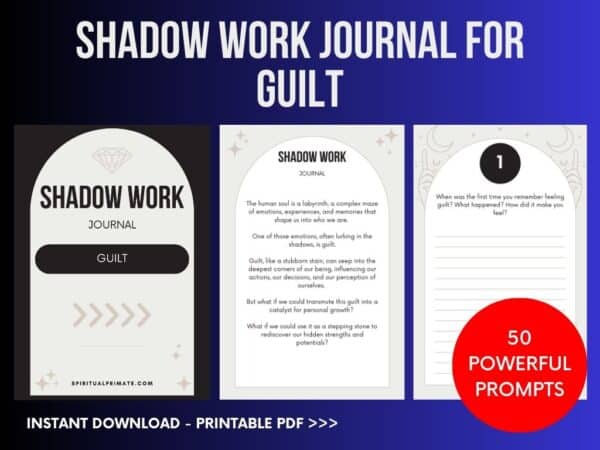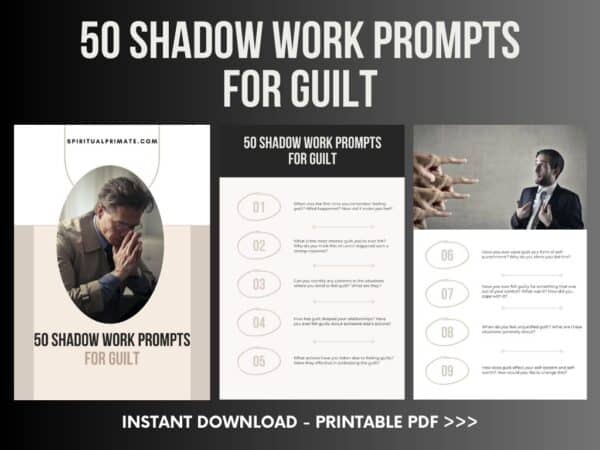The human soul is a labyrinth, a complex maze of emotions, experiences, and memories that shape us into who we are. One of those emotions, often lurking in the shadows, is guilt.
Guilt, like a stubborn stain, can seep into the deepest corners of our being, influencing our actions, our decisions, and our perception of ourselves. But what if we could transmute this guilt into a catalyst for personal growth? What if we could use it as a stepping stone to rediscover our hidden strengths and potentials?
Through the practice of shadow work, we can. In this transformative guide, “Unearth Your Hidden Power: 50 Profound Shadow Work Prompts for Transmuting Guilt into Personal Growth”, we will explore how guilt can be a mirror reflecting our deepest selves, and how we can use it as a tool to facilitate our personal growth.
Are you ready to illuminate the shadows of guilt and journey towards the light of self-discovery?

Understanding Guilt: A Deep Dive into the Human Emotion
Guilt is an emotion that we’ve all experienced at some point in our lives. It’s a complex feeling, often associated with remorse and regret. But what exactly is guilt, and how does it impact our psychological and emotional well-being?
The Essence of Guilt
Guilt, as an emotion, can be described as a sense of regret or remorse for actions, whether real or imagined, that go against one’s moral codes. It is a self-conscious emotion, implying that it’s directly linked to our awareness of ourselves and our actions. It often serves as a ‘moral compass,’ nudging us when we veer off our path of ethical behavior.
The Psychology Behind Guilt
From a psychological perspective, guilt is a response to the violation of social norms and personal standards. It is a part of our cognitive-emotional system that promotes prosocial behavior and discourages antisocial actions. Guilt is a signal that we’ve caused harm, and it motivates us to make amends and fix the situation.
Guilt and Personal Growth
While guilt can often feel like a painful burden, it can also serve as a catalyst for personal growth. It can lead us to reevaluate our actions and behaviors, push us to make necessary changes, and help us develop empathy for others. Guilt, when handled appropriately, can be a tool for self-improvement and emotional maturity.
The Dual Nature of Guilt
In conclusion, guilt is a complex and multifaceted emotion. It’s an internal moral compass that guides us and keeps us aligned with our values. While it can cause discomfort and distress, it can also be a powerful motivator for change and personal growth. Understanding guilt and learning how to manage it constructively is crucial for our emotional and psychological wellbeing.
So the question remains, how will you allow your experience of guilt to shape your path towards personal growth?

Using Shadow Work to Alleviate Guilt
Understanding Shadow Work
Shadow work is a psychological approach that involves confronting and integrating the darker, unknown parts of our personalities, also known as our shadow selves. These are the aspects we might choose to ignore because they make us uncomfortable or challenge our self-image. However, integrating these aspects into our conscious awareness can lead to profound personal growth and improvement in mental health.
Guilt and the Shadow Self
Guilt is a common emotion that often lurks within our shadow selves. It’s a complex emotion tied to regret, self-punishment, and feeling responsible for negative outcomes. Guilt can make us feel undeserving of happiness and success. Shadow work allows us to confront this guilt, understand its roots, and integrate it into our conscious awareness.
Shadow Work Techniques for Guilt
Journaling
Journaling is a powerful tool in shadow work. It allows you to express your feelings of guilt on paper, externalizing them and making them less intimidating. This process aids in understanding the source of your guilt and finding ways to resolve it.
Mindfulness and Meditation
Practicing mindfulness and meditation can help you become more aware of your guilt. Meditation provides a safe space to observe your emotions without judgment, which is crucial in shadow work.
Therapy and Counseling
Working with a skilled therapist or counselor can be incredibly helpful in shadow work. They can provide guidance and techniques to safely explore your guilt and other negative emotions.
The Transformational Power of Shadow Work
Shadow work can transform guilt from a destructive force into a catalyst for growth. By acknowledging and understanding your guilt, you can learn from it, forgive yourself, and move forward. Shadow work encourages self-acceptance, promoting a healthier relationship with yourself and others.
Guilt, when faced and understood, can lead to profound personal growth. Shadow work provides the tools and methods to safely confront and integrate guilt into our conscious awareness. It’s a journey of self-discovery and transformation that can help us navigate life with more grace, empathy, and resilience. Remember, there is no light without shadow, and embracing our shadows can lead to a brighter, guilt-free future.

Shadow Work Prompts for Guilt
1. When was the first time you remember feeling guilt? What happened? How did it make you feel?
2. What is the most intense guilt you’ve ever felt? Why do you think this situation triggered such a strong response?
3. Can you identify any patterns in the situations where you tend to feel guilt? What are they?
4. How has guilt shaped your relationships? Have you ever felt guilty about someone else’s actions?
5. What actions have you taken due to feeling guilty? Were they effective in addressing the guilt?
6. Have you ever used guilt as a form of self-punishment? Why do you think you did this?
7. Have you ever felt guilty for something that was out of your control? What was it? How did you cope with it?
8. When do you feel unjustified guilt? What are these situations generally about?
9. How does guilt affect your self-esteem and self-worth? How would you like to change this?
10. Have you ever felt guilty for your successes? What is the root of this guilt?
11. How does guilt impact your decision-making process?
12. What role does guilt play in your procrastination or avoidance behaviors?
13. How often do you struggle with guilt associated with past mistakes?
14. Have you ever felt guilty for someone else’s happiness? Dig deep and explore why.
15. What guilt are you holding onto that you need to forgive yourself for?
16. Have you ever felt guilty for expressing your emotions? How does this affect your emotional health?
17. How does guilt affect your physical health? Do you notice any specific symptoms?
18. Have you ever felt guilty for setting boundaries? What was the situation?
19. How would your life be different if you released your guilt? How can you make this a reality?
20. What does guilt prevent you from doing?
21. Have you ever felt guilty for your own happiness? Explore why this might be.
22. How has guilt influenced your career decisions?
23. Have you ever felt guilty for prioritizing yourself? Why did you feel this way?
24. What role does guilt play in your fear of failure or success?
25. Have you ever felt guilty for saying no? How can you work on this?
26. How frequently do you feel guilty for not meeting others’ expectations?
27. How does guilt stop you from pursuing your dreams?
28. Have you ever felt guilty for wanting more from life? What is at the root of this guilt?
29. How would you describe the relationship between guilt and your mental health?
30. Have you ever blamed yourself for something that wasn’t your fault? How does guilt play into this?
31. How does guilt influence your communication style?
32. Have you ever felt guilty for outgrowing people or situations? Why did you feel this way?
33. How does guilt affect your productivity and creativity?
34. Have you ever felt guilty for making a decision in your best interest? How can you shift this thinking?
35. How does guilt stop you from expressing your true self?
36. Have you ever felt guilty for not being able to help someone? What can you learn from this?
37. How does guilt influence your ability to trust yourself?
38. Have you ever felt guilty for ending a toxic relationship? How can you reframe this guilt?
39. How does guilt affect your personal growth and self-improvement journey?
40. Have you ever felt guilty for putting your needs first? How can you overcome this?
41. How does guilt influence your perception of love and relationships?
42. Have you ever felt guilty for your flaws or imperfections? Explore why.
43. How can you transform your guilt into a source of personal power?
44. Have you ever felt guilty for your beliefs or values? How can you honor yourself despite this guilt?
45. How does guilt change the way you view yourself?
46. Have you ever felt guilty for breaking the rules or norms? What did you learn from this?
47. How does guilt affect your ability to enjoy life?
48. Have you ever felt guilty for your privileges? How can you use them for good without feeling guilty?
49. How can you use your guilt to better understand and empathize with others?
50. How can you turn guilt into a catalyst for positive change in your life?
And so, we have journeyed through the labyrinth of guilt, using shadow work as our compass. We’ve unearthed the hidden power that lies in the dark corners of our being, transforming guilt into a profound catalyst for personal growth.
Guilt, once a paralyzing force, can become a liberating one when we dare to face it, understand it, and learn from it. Through these 50 profound shadow work prompts, we have not only confronted our guilt but have also learned to transmute it into a force of transformation and growth.
As we conclude our journey, a question remains: Are you ready to continue this exploration, to further delve into your shadows and uncover the potential that lies within your guilt?
Dive Deeper Into Your Shadow Work Journey
- Product on sale
 Printable Shadow Work Journal for Guilt [PDF]Original price was: $11.98.$5.99Current price is: $5.99.
Printable Shadow Work Journal for Guilt [PDF]Original price was: $11.98.$5.99Current price is: $5.99. - Product on sale
 50 Shadow Work Prompts for Guilt | Printable PDFOriginal price was: $5.98.$2.99Current price is: $2.99.
50 Shadow Work Prompts for Guilt | Printable PDFOriginal price was: $5.98.$2.99Current price is: $2.99.

